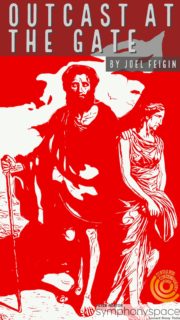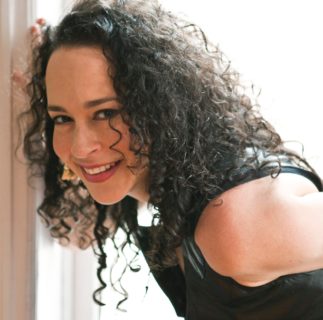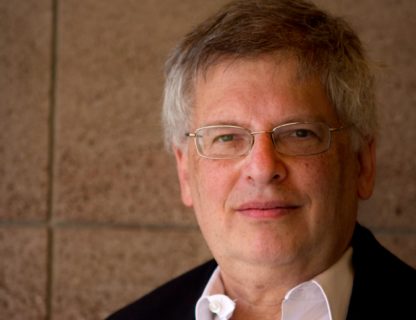Outcast at the Gate is a drama about refugees: a blind old man, supported by his daughter, seeking food and shelter. It is also a drama of redemption: the old man is “stained to the core of his existence,” and at the same time somehow innocent: he is Oedipus, former king of Thebes, who has unwittingly killed his father and married his mother. The end will reveal him as a prophet, blind, but leading his daughters and the King of his new homeland to a miraculous appointment with the waiting Gods.
The two refugees have found themselves in a beautiful, peaceful grove when a terrified stranger arrives and tells them to leave: the grove is sacred to the Furies, the horrifying deities of vengeance. But Oedipus knows that he has found his final home, and he offers prayers of thanks to the deities of the grove for the “great consummation” he knows is near.
The townspeople arrive, searching for the imposter, and when they learn his name they order the strangers to leave their land. Oedipus insists that he is innocent, that he had committed his horrible crimes unknowingly, and the elders decide to summon the King of Athens, Theseus, for the final decision. Suddenly, a woman arrives—Ismene, the remaining daughter of Oedipus, joyfully greeting her father and her sister, Antigone. Ismene brings disastrous news from Thebes: the old man’s younger son has seized the throne of Thebes; his brother Polynices has fled and plans to attack the city. But new oracles have arrived, declaring that the fate of Thebes rests in Oedipus’s hands alone. Theseus enters, greets the old man and his daughter with compassion, and declares Oedipus a citizen of Athens. The King promises to protect the blind man from the Thebans who will come to seek his support. Invited to take refuge in the King’s palace, Oedipus choses to remain in the sacred grove. Theseus leaves, and the chorus sings of the beauty of the wanderer’s new home.
Creon, the Theban elder, arrives, and failing to persuade Oedipus to return, seizes the old man and his daughters. They are saved by Theseus and his army, and the king tells Oedipus that a stranger has come: Polynices, his son, who tries to persuade Oedipus to back him in the impending war. The old man curses him and foretells the horrible future: his two sons will kill each other before the gates of Thebes.
Polynices leaves in despair, and suddenly a violent storm arises, terrifying all but Oedipus, who knows that he is summoned by the Gods. Unaided, but still blind, Oedipus rises and leads Theseus and his daughters to where he knows he must die. He bids farewell to his daughters, for only Theseus may see his end. Suddenly the voices of the Gods call out to Oedipus: “Come! You hold us back too long. Now is the time.” The old man disappears, and Theseus is left alone, saluting the gods and the earth in one great prayer.
Antigone and Ismene reappear, mourning Oedipus’s death. When Antigone asks to be sent to Thebes to try to save her brothers, Theseus agrees, the two sisters leave, and the chorus awaits “the appointed end”.
About Joel Feigin
"You’re a hopeless romantic." -Leonard Bernstein to Joel Feigin at a private composition lesson at Tanglewood in 1981
Joel Feigin’s compositions have been praised for their “strong impact, as logical in musical design as they are charged with emotion and drama.” (Opera Magazine). Feigin’s most recent opera, Twelfth Night, has been performed in North Carolina, Chicago, and southern California, where it was hailed as a “glittering masterpiece” by critic Dan Kepl. Excerpts were also presented at New York City Opera’s VOX Showcase series and Opera America’s New Works Sampler.
Feigin’s music has been extensively performed throughout Europe, Asia, and America. Mysteries of Eleusis, Feigin’s first opera, commissioned and premiered by Theatre Cornell, was produced again at the Moscow Conservatory, and later at the Russian-American Operatic Festival. Other commissions include a Fromm Commission for Aviv: Concerto for Piano and Chamber Orchestra, written for Yael Weiss, and piano works for Margaret Mills and Leonard Stein. CDs include the 2-CD set Transience, piano works performed by Margaret Mills and Robert Cassidy, and the large chamber work, Lament Amid Silence, featuring violist Helen Callus.
Dr. Feigin studied with Nadia Boulanger at Fontainebleau and with Roger Sessions at The Juilliard School. Honors include a Mellon Fellowship, and a Senior Fulbright Fellowship, and the Dimitri Mitropoulos Prize in Composition at the Tanglewood Music Center. An accomplished pianist and accompanist, Feigin studied with Rosina Lhevine, and worked at the Metropolitan Opera in New York with Nico Castel.
The Joel Feigin Collection at the New York Public Library of the Performing Arts at Lincoln Center opened in 2011. A student of Zen Buddhism, Feigin is Professor Emeritus of Composition at the University of California, Santa Barbara.
Read Less







